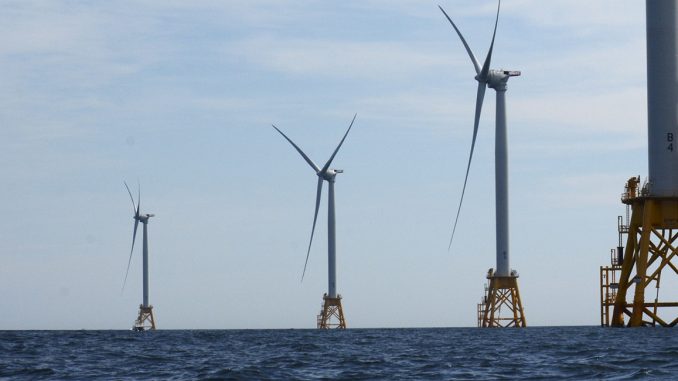
In stark contrast to the bucolic vision of harvesting energy from the wind, New Jersey is witnessing harsh political reality. Gov. Phil Murphy has approved a large offshore wind farm in southern New Jersey, and local residents and officials who oppose the project because of extremely high costs, the lack of reliable energy, and the impact on marine life are being steamrolled.
Murphy’s stated objective is to reduce emissions from conventional fuels to stop global warming. Yet climate models show that the global temperature reduction would be infinitesimal, even if New Jersey stopped consuming all conventional fuels for its electricity needs. For these insignificant effects on temperatures, the governor is asking New Jersey residents to pay some $74 billion to build offshore wind farms that are significantly less reliable at producing electricity than fossil fuels and nuclear energy.
The first of these wind boondoggles is Ocean Wind 1, an 1,100-megawatt project in the early stages of construction off the shores of southern New Jersey, developed by Danish company Ørsted. On a windy day, the Ocean Wind 1 project could power some 500,000 homes, rivaling the output from the Hope Creek Nuclear Generating Station on the Delaware River.
But Ocean Wind 1 is only the start of Murphy’s ambitions. The governor’s aims are tenfold—he wants to install 11,000 megawatts of offshore wind by the year 2040, which would include the much larger Atlantic Shores project that would see hundreds of turbines the height of the Eiffel Tower installed as close as 9 miles from the shore.
Let us count the problems with this plan.
Offshore wind is unpopular with locals, and opponents made their voices heard at a public forum last week in Ocean City. Residents mentioned the recent increases in whale deaths; the potential harm to the tourism industry from destruction of historic viewsheds; and the lack of transparency from the state regulator, the New Jersey Board of Public Utilities.
A local reporter summed up the meeting by saying, “One thing was clear after speaker after speaker denounced the projects: Cape May County officials and residents clearly do not want wind farm energy off the coast.”
The cost of the governor’s offshore wind ambition is staggering. We took the amount of offshore wind he wants to build—11,000 megawatts—and multiplied it by the Energy Information Administration’s estimate of the upfront cost of construction of offshore wind in New Jersey, which is just over $6.75 million per megawatt. We got a price tag of $74.25 billion. Spread over the population of New Jersey, that amounts to just over $8,000 per resident.
The wind turbines these funds would finance would not meaningfully reduce global temperatures. Even if New Jersey’s entire electricity sector stopped emitting greenhouse gases today, our estimates in The Heritage Foundation Center for Data Analysis (using a U.N. Intergovernmental Panel on Climate Change climate simulator model) indicate the temperature reduction would be no more than 0.0003 degrees Celsius by 2050 and 0.0007 degrees Celsius by 2100. (The Daily Signal is the news and commentary website of The Heritage Foundation.)
So why move forward? The mandated buildout of offshore wind in New Jersey is a political scheme for Murphy to earn glowing headlines and enrich his friends at foreign green energy companies at the expense of unwitting residents. Actions this misleading and harmful to the state could rightly be characterized as fraud if they weren’t being done with the legal backing of the state legislature.
But it’s not just New Jersey. The same story is playing out across the country: Anyone who doesn’t submit to net-zero carbon emissions schemes will be coerced.
New Jersey residents and local leaders are seeing the ugly side of green energy. By any measure, the governor’s dream of offshore wind is a bad bargain, but the silver lining is that it’s not too late to change course. As the governor learns just how unpopular and expensive his net-zero vision is, he should drop his arbitrary offshore wind goals and walk away.
Then it would be no harm, no foul—residents keep their money, whales rejoice, and the governor spares everyone the public fight.
Have an opinion about this article? To sound off, please email letters@DailySignal.com, and we’ll consider publishing your edited remarks in our regular “We Hear You” feature. Remember to include the URL or headline of the article plus your name and town and/or state.

